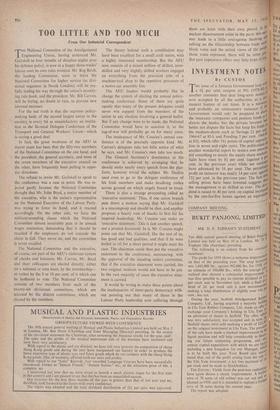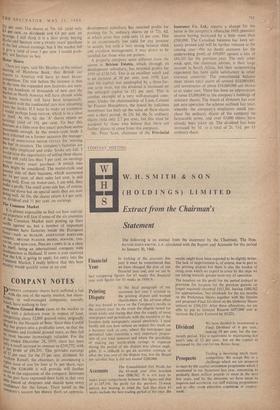INVESTMENT NOTE
By CUSTOS
it tht eCt S it
THE issue of a Jamaica Government loan a 64 per cent. coupon at 991 (1978-80 another reminder that dear long-term moo now accepted by all the authorities as a manent feature of our times. It is a nuiss and probably an unnecessary nuisance if Government would only be prepared to di the insurance companies and pension funds directs the banks, but the private investor better not dispute the facts but keep his fund the medium-shorts such as Savings 24 per 1964-67 at 83-136 and Funding 3 per cent. 1961 at 831, which offer 16+ points of capital aPPrc tion in seven and eight years. The publicatico .another wonderful report by MARKS AND VP did something to steady the equity share mad Sales have risen by 84 per cent. (against 4 cent. in the previous year) while net earn have advanced by 16, per cent. The perceni profit on turnover was nearly 14 per cent. ago 124 per cent. in the previous year. The fact selling prices have been lowered suggests the management is as skilled as ever. The ( dend is raised to 40 per cent. on capital incre by the one-for-five bonus against an equiva
had in
-6S Cir
of
en. Per
ngs agn flit
that that
sed
TI E SPECTATOR. MAY 13. 1960 ,i311 Per cent. The shares at 70s. 6d. yield only 4.9 Per cent, on dividends and 4.8 per cent. on "ttnings. I still think it is a dear price, buying Marks and Spencer over a twenty years' purchase of the last annual earnings, but if the market fell to give a yield of over 3 per cent. I would prob- ably not hesitate to buy
Motor Shares
There are signs, said Mr. Hambro at the annual tfleeting of Hambros Bank, that British car exports to America will have to meet fiercer ,c_omPetition. The risk before the investor is that .4 the time the expanded new factories are turn- ing out hundreds of thousands of new cars the arket in North America will have shrunk while the home market will have been temporarily s.aturated with the continental cars now streaming from the docks. If 1 were to make an exception , Would perhaps keep JAGUAR, which is in a class DY itself. At 49s. 6d. the 'A' shares return an earnings yield of 19f per cent. To buy this business at a little over five years' purchase seems ,teasonable enough. In the motor-cycle trade I nave criticised on a former occasion the manage- Tient Of ASSOCIATED MOTOR CYCLES for `missing the bus' in scooters. The company's factories are 11°w full employed and order books are full. I \t'ould seize the opportunity of selling these shares ‘t'bich still yield less than 5 per cent. on earnings
er twenty years' purchase. A switch into RSA might be considered. The motor-cycle and for noter side of their business, which accounted
. 34 per cent, of their sales last year, is still doing Well. Even on motor-cars, I am told, they nlake a profit. The small arms side has, of course, been cut down but on special steels they are now doing well. At 56s the shares return 4.4 per cent. On dividend and 11 per cent. on earnings. The Common Market It is almost impossible to find out how individ- ual exporters will fare if some of the six countries of the Common Market start putting up their tariffs against us, but a number of important e°n1Panies have factories inside the European f cence—such as DUNLOP, ASSOCIATED PORTLAND L 14ENT, BRITISH PLASTER BOARD, HOOVER, LIM L - vER, and BOWATER. PiiruPs LAMPS is in a class b` h/1 itself, being an international company with tiadquarters in Holland. If news is ever received that the UK is going to apply for entry into the °Mmon Market, I really believe that this bear nlarket would quickly come to an end.





































 Previous page
Previous page